
 |
Quote:
Don't know why its displaying a sad face that was inadvertant |
Yeah, the Morgan station looks great! I saw it last weekend when I was visiting the area. I, too, hope that it can serve as a design template for future CTA developments.
Quote:
|
Quote:
Damn, you're hard to please |
Quote:
Quote:
|
Quote:
Urban frontier is right, beautiful area, OK people, tons of potential. |
Quote:
Quote:
Quote:
Quote:
Quote:
I had a dish they called Filete En Hoja De Mazorca, which was a fish fillet wrapped with a corn leaf and stuffed with tomato, jalapeno and onions. I really liked it. That one is tilapia, but they also have a similar dish using tuna wrapped in a banana leaf. |
I'll have to try that when I'm down there next. That's like 3 or 4 blocks from my building.
|
Quote:
Yes Douglas Park is the urban frontier and it has quite a bit of potential may be a new emerging hot area. Yes you are right the area directly around the Morgan station is not the urban frontier; in fact I ate on Randolph yesterday. Ironic considering you were probably typing while I was eating. |
The Station looks really nice, but I'm not convinced it will be as forgiving to vandalism and the cold Chicago winters. Polycarbonate panels used as roofing tend to get a grimy appearance fast. And while I realize they are lightweight and easy to swap out, I think a Kalwall solution would have been more appropriate.
I cringe at the stainless steel near the entry. It should be granite. People are going to mar that up with markers and stickers. Someone will lean against it and scrape it up. The fingerprints are enough to distract from the aesthetic of the material. It also looks like there's lots of "dust shelf" and "garbage gap" opportunities where debris will pile up in the stairways. Anyone who has really looked at the Fullerton and Belmont stations sinced they opened will know what I mean. Again I find the architecture very nice, but from a maintenance standpoint I'd be very concerned. These issues need to be very well thought out since money for upkeep is tight. |
Morgan Station (Morgan & Station)
(Taken by me)
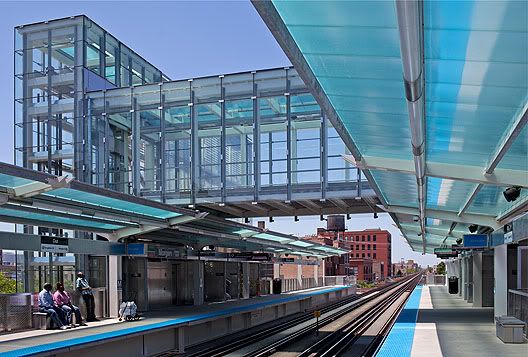 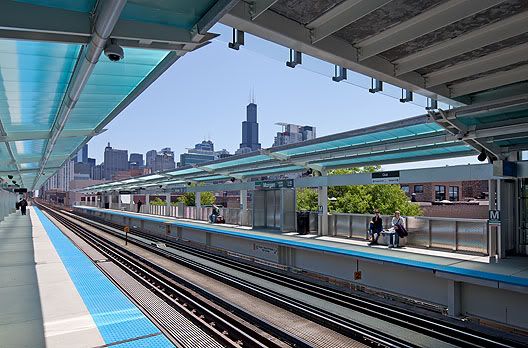 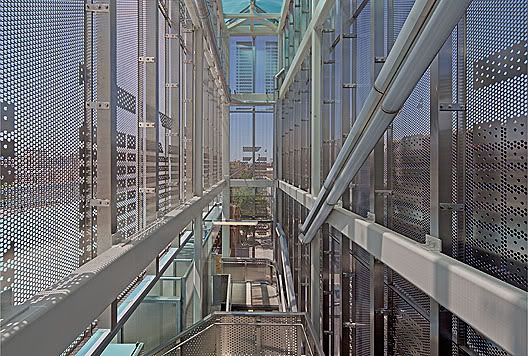  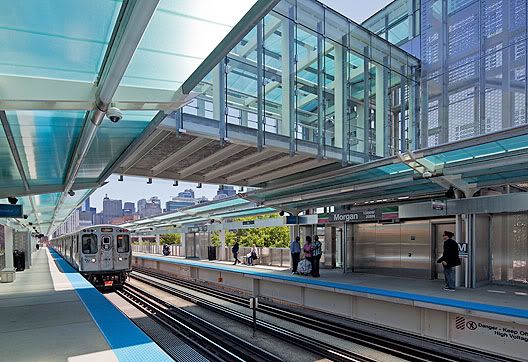   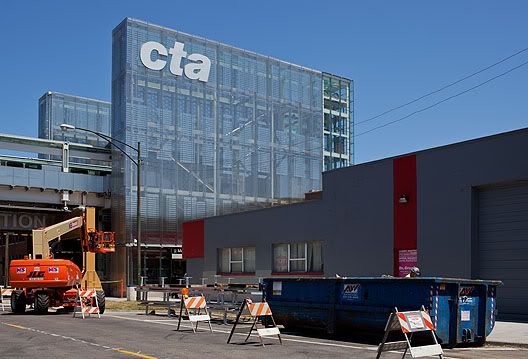 |
Put Chicago on the path to an electrified Metra
http://gridchicago.com/2012/put-chic...trified-metra/
Reactions to CDOT’s Chicago Forward Action Agenda vary Quickly: Union Station Master Plan study released today at breakfast on vintage train Put Chicago on the path to an electrified Metra by GUEST CONTRIBUTOR on MAY 23, 2012 · 10 COMMENTS AND 6 REACTIONS Ed. note: Roland Solinski is a graduate student of architecture at Tulane University. “I am a Chicagoan by birth and the city runs in my blood. I’m fascinated by all aspects of urban design and urban systems, but especially transit systems and public space.” Photo is of a southbound Metra Electric train. In November of 2010, the Chicago Tribune published an article that shocked Metra commuters. In it, Tribune reporters revealed that massive quantities of diesel exhaust were hanging in the air on platforms at Union Station and Ogilvie Transportation Center. Worse, the atmosphere inside each railcar contained the same exhaust at even higher concentrations – 72 times that of a normal city street. In numerous other cities, commuters do not need to worry about harmful exhaust fumes, because their trains run off of electric power. In fact, many cities installed rail electrification systems at the turn of the last century specifically to eliminate toxic smoke emissions, including the Illinois Central’s line right here in Chicago, now called Metra Electric. Clean air is just a side effect; electric trains offer a whole range of benefits with enormous potential. Just like a Porsche with a finely-tuned engine, modern electric trains accelerate at a much greater rate than Metra’s outmoded diesel locomotives. Since Metra stops are so close together, particularly in inner suburbs, trains currently spend a lot of time accelerating and slowing down, often not even reaching their 70 MPH speed limit. Alternatively, many Metra trains save precious time by simply running express and skipping whole groups of stations, benefiting outer suburban residents at the expense of inner-suburban and city residents. A fast-accelerating electric train could substantially shorten travel times and improve service for all Metra riders by bringing the train up to top speed faster. With greatly reduced travel times, Metra could then consider a few new stations along its lines, making additional stops without inconveniencing far suburban riders. These new stations would fall particularly within the City of Chicago, where stations are currently very infrequent (aside from the Metra Electric line). Metra’s own ridership statistics, available on RTAMS, suggest that new stations inside the city would be very popular, so long as Metra’s express trains do not skip them altogether – for example, Ravenswood is currently the busiest station on the UP-North line after Ogilvie itself. An electric commuter train in Montréal, Québec. Photo by Sean Marshall. All these facts indicate that electrification could spur significant regional changes. It would enable a new kind of Metra service with 15-minute frequency and faster travel times – essentially an extension of the city’s rapid-transit network. Just like the ‘L’, electrified Metra service could transform Bungalow Belt neighborhoods and inner-ring suburbs into heavily transit-oriented areas, offering them the same fast service into downtown that many city residents currently enjoy while raising property values and encouraging infill development. Through electrification and proper planning, these benefits are achievable at a fraction of the cost of expanding the ‘L’. In the 21st century, Metra needs to take a long, hard look at electrifying its busiest lines. Partially in response to the diesel-fumes debacle, Metra hosted a workshop on electrification in 2011. More of an industry symposium than a serious study, the workshop’s announcement still gave the impression that Metra was ready to start asking serious questions. However, the workshop documents do not even hint at a plan for Metra to move forward on studying electrification, suggesting that Metra officials are dismissive of the whole concept. In the same documents, those officials cite various reasons and excuses for why electrification wouldn’t work in Chicago – despite the fact that it already does and has for over a century on the Metra Electric. Although the officials did a good job of laying out the technical challenges, many of those challenges seem to be strongly overstated. One official contends that low clearance on overhead bridges may restrict the installation of modern overhead wire along Metra lines, yet Metra Electric has some of the city’s lowest overpasses and seems to run just fine. In a similar vein, the tall double-stack cars that some freight railroads use to move shipping containers might force Metra to install the wire higher than normal. Finally, the construction of an electric system is expensive, including overhead wire, substations spaced out along the line, and new electric trains themselves. These objections, however, are not nearly enough to doom electrification to the scrap heap of failed ideas. Instead the health benefits, savings on diesel fuel, and most importantly the faster acceleration and better service are well worth the investment for Chicago, and will save money over time for Metra and Chicago-area taxpayers while spurring sustainable transit-oriented development. The VIRM electric train in the Netherlands, which is for commuting and intercity passengers, uses a split-level carriage design. You enter on a plane level with the platform and then either traverse stairs going up or down. The platform-level deck, at each end of the carriage, holds the space for passengers with mobility devices or bicycles. The process would take time. Metra is a patchwork of rail lines owned by various railroads, and each line poses its own challenges – some more difficult than others. Metra itself owns the two Milwaukee District lines, the Rock Island, and the Metra Electric. On these lines, electrification can proceed easily (Metra Electric notwithstanding). The remaining six lines are owned by freight railroads, who would need to agree to the electrification. Initially after installation, Metra could swap out its aging diesel locomotives for electric ones. In fact, Metra could even purchase dual-mode locomotives to start taking advantage of the electric system before it’s even finished. These would produce no fumes and burn no costly diesel fuel on electrified segments of track, and would allow Metra to use its current fleet of railcars. However, they would not have the full benefits of acceleration and improved service. For that, Metra would need to purchase electric multiple units (EMUs) like those that Metra Electric runs. EMUs have no locomotive, but instead are simply a series of passenger cars with small motors in each one that work in sync to move the train. How much would this all cost? We can get a good sense by looking at Caltrain, which is in the midst of planning an electrification project of its own. Caltrain is very similar to a Metra line, with two tracks, high ridership, and relatively frequent stations. It runs from San Francisco to San Jose, California. Currently, cost estimates for the electrification system are roughly $950 million for 52 miles of track, or $18 million per mile. This is a high end estimate; some projects have cost far less. Amtrak electrified the Northeast Corridor between New Haven and Boston in the 1990s, spending $475 million for 157 miles of track. Adjusted for inflation, that project cost only $4 million per mile. Metra’s BNSF is a good candidate for electrification; it has Metra’s highest ridership and a series of closely-spaced stations between Cicero and Lisle. Using the two previous cost figures as a range, it would cost between $675 million and $150 million to electrify the 37.5-mile BNSF. This is a huge range to be sure, but even at the high end the cost is only $10,448 for every existing weekday rider. If Metra can hold costs down to Amtrak levels, the cost is only $2,500 per existing rider. When stops like Brookfield, Riverside, and Berwyn start to see much higher service frequencies, the ridership is sure to grow dramatically, increasing revenue. On the other hand, high diesel fuel costs will be replaced with a comparatively low electric bill, decreasing expenses. Both of these changes together create substantial room in Metra’s budget that can go towards the construction and maintenance of an electrified system. Electrification has the potential to improve or solve many problems facing Metra and the Chicago region. The savings on fuel will improve Metra’s bottom line and make it virtually immune to changing fuel prices, while the elimination of emissions will dramatically improve air quality around each line. Most importantly, electrification could begin to alter the fabric of Chicagoland, stitch the region back together and link inner-ring suburbs both to downtown and to growing areas farther out, all while costing far less than expanding the ‘L’. In an era of ever-shrinking public resources, ever-growing demand for transit, and stiff global competition among cities, Chicago can’t afford to spend too much on transit or to be satisfied with the status quo. Electrifying Metra is the right move to make. |
^^^ I would love to see this happen, but it seems that having multiple ownerships and freight considerstions really hampers any widespread implementation.
I could see The Metra owned Rock Island making the transition, the proposed SES and possibly the BNSF only if they move it to the LaSalle Street station. But piece mealing various lines that run into Union and Ogilvie seems far fetched. I imagine it being an 'all or nothing' situation. |
I don't see why it needs to be so dramatic. You electrify the lines one by one in a gradual process, starting with the easy ones (Milw, RI, SWS) and moving on to the most difficult ones (BNSF, UP-W). Heritage Corridor isn't worth the expense given ridership levels; neither is NCS.
|
Here's my Proposed Metra System extensions...etc infill stations...i'm still doing the Map , so I only have the station by Station guide...and only Ogilvie Transportation Center. Picture this an Electrified Ogilvie Network...I will have the Map up by Sunday along with the rest of the Metra Network.
Current , Proposed & Planned Stations Union Pacific/North Line Ogilvie Transportation Center Clybourn Ravenswood - Evanston Rogers Park - Evanston Main Street - Evanston Davis Street - Evanston Center Street - Evanston Wilmette Kenilworth Indian Hill - Winnetka Winnetka Hubbard Woods - Winnetka Glencoe Braeside - Highland Park Ravinia Park - Highland Park Ravinia - Highland Park Highland Park Highwood Fort Sheridan Lake Forest Lake Bluff Great Lakes - Lake Bluff North Chicago Waukegan Zion Winthrop Harbor Kenosha North Kenosha - Carthage College Mount Pleasent Racine North Bay - Racine Oak Creek South Oak Creek South Milwaukee Cudahy Harborview - Milwaukee Milwaukee Union Pacific/West Line Ogilvie Transportation Center Kedzie Oak Park Riverforest Maywood Melrose Park Bellwood Berkeley Elmhurst Villa Park Lombard Glen Ellyn College Avenue - Wheaton Wheaton Winfield West Chicago Geneva La Fox Elburn Maple Park Cortland Dekalb Rochelle Union Pacific/Northwest Line Ogilvie Transportation Center Clybourn Irving Park Jefferson Park Gladstone Park Norwood Park Edison Park Park Ridge Dee Road - Park Ridge Des Plains Cumberland - Des Plains Mount Prospect Arlington Heights Arlington Park - Arlington Heights Palatine Barrington Fox River Grove Cary Pingree Road Crystal Lake Ridgefield Woodstock Harvard Sharon Clinton Janesville Union Pacific/Northwest Line (McHenry Branch) Ogilvie Transportation Center Clybourn Irving Park Jefferson Park Gladstone Park Norwood Park Edison Park Park Ridge Dee Road - Park Ridge Des Plains Cumberland - Des Plains Mount Prospect Arlington Heights Arlington Park - Arlington Heights Palatine Barrington Fox River Grove Cary Pingree Road Prairie Grove McHenry Johnsburg Ringwood Richmond Genoa City Pell Lake Lake Geneva Elkhorn Delavan Next To tackle : Rock Island & Metra Electric Network |
Current , Proposed & Planned Stations
Electrified Rock Island Disrect Rock Island District - Main line LaSalle Street 'Lou' Jones/Bronzeville 95th Street - Longwood 103rd Street - Washington Heights Blue Island - Vermont Street Robbins Midlothian Oak Forest Tinley Park Tinley Park - 80th Avenue Mokena - Hickory Creek Mokena - Front Street New Lenox Joliet Rockdale Minooka Morris Seneca Marseilles Ottawa La Salle Rock Island District - Beverly Hills Branch LaSalle Street 'Lou' Jones/Bronzeville Brainerd 91st Street - Beverly Hills 95th Street - Beverly Hills 99th Street - Beverly Hills 103rd Street - Beverly Hills 107th Street - Beverly Hills 111th Street - Morgan Park 115th Street - Morgan Park 119th Street - Blue Island 123rd Street – Blue Island Prairie Street - Blue Island Blue Island - Vermont Street Robbins Midlothian Oak Forest Tinley Park Tinley Park - 80th Avenue Mokena - Hickory Creek Mokena - Front Street New Lenox Joliet Southwest Service LaSalle Street 'Lou' Jones/Bronzeville South Ashland - West Englewood Wrightswood Ashburn Oaklawn Chicago Ridge Worth Palos Heights Palos Park Orland Park 143rd Street Orland Park 153rd Street Orland Park 179th Street Laraway Road - New Lenox Manhattan |
Current , Proposed & Planned Stations
Metra Electric - Main line Millennium Station Van Buren Street Museum Campus/11th Street 18th Street McCormick Place 27th Street Kenwood/47th Street Hyde Park/53rd Street 55th–56th–57th Street 59th Street 63rd Street 75th Street-Grand Crossing 79th Street-Chatham Avalon Park-83rd Street Woodruff-87th Street Chesterfield-91st Street 95th Street – Chicago State University 103rd Street-Rosemoor 107th Street Station Pullman/111th Street Kensington/115th Street Riverdale Ivanhoe 147th Street / Sibley Boulevard Harvey Hazel Crest Calumet Homewood Flossmoor Olympia Fields 211th Street-Lincoln Highway Matteson Richton Park University Park Monee Pentone Manteno Bourbonnais Bradley Kankakee Metra Electric Blue Island Branch Millennium Station Van Buren Street Museum Campus/11th Street 18th Street McCormick Place 27th Street Kenwood/47th Street Hyde Park/53rd Street 55th–56th–57th Street 59th Street 63rd Street 75th Street-Grand Crossing 79th Street-Chatham Avalon Park-83rd Street Woodruff-87th Street Chesterfield-91st Street 95th Street – Chicago State University 103rd Street-Rosemoor 107th Street Station Pullman/111th Street Kensington/115th Street State Street Stewart Ridge West Pullman Racine Ashland Blurr Oak Blue Island Metra Electric Chicago Branch Millennium Station Van Buren Street Museum Campus/11th Street 18th Street McCormick Place 27th Street Kenwood/47th Street Hyde Park/53rd Street 55th–56th–57th Street 59th Street 63rd Street Stony Island Bryn Mawr South Shore windsor Park Cheltenham 83rd Street 87th Street South Chicago (93rd Street) Metra Electric Chicago Heights Branch Millennium Station Van Buren Street Museum Campus/11th Street 18th Street McCormick Place 27th Street Kenwood/47th Street Hyde Park/53rd Street 55th–56th–57th Street 59th Street 63rd Street 75th Street-Grand Crossing 79th Street-Chatham Avalon Park-83rd Street Woodruff-87th Street Chesterfield-91st Street 95th Street – Chicago State University 103rd Street-Rosemoor 107th Street Station Pullman/111th Street Kensington/115th Street Golden Gate Dolton South Holland Thorton Chicago Heights South Chicago Heights Crete Up Next : South Shore Network |
As CTA Gray Line notes, the Union Station Master Plan is out.
It's a big report and it makes a lot of recommendations. Here are a few that caught my eye. 1. Through tracks for all platforms are out of the question. The tracks don't line up and demolishing everything built over them to make them line up is just not feasible. Demolishing 222 Riverside would allow for some of the tracks to be linked, but extremely long platforms with a jog in the middle, or two sets of platforms arranged end-to-end with crossovers in the middle, with no discernable way to access them from the head house, is also not particularly useful. 2. Platforms with through tracks CAN be added by converting the old mail platforms. and/or by building them under Clinton/Canal. (1 level/2 platforms/4 tracks under Canal; 2 levels/2 platforms/4 tracks under Clinton.) Building new tracks under Clinton/Canal will be challenging since it will require slow and expensive stacked drift excavation under Fulton Station Condominums. 3. It will be possible to add a fourth surface-level northern lead track but it will require A. rebuilding the 100 year old CNW viaduct that carries the UP metra lines into Ogilvie (which will need to be done eventually anyway) and B. a small right-of-way dedication from River Point/444 W Lake. 4. The report recommends eventually widening all the south platforms by removing the baggage platforms, but makes no mention of doing the same for the north platforms. |
^^^^On the UP North line there is a proposed station at Peterson that I do not see listed. My sources tell me that this station is as good as set. between ridge and peterson north of peterson. Also neither rogers park nor ravenswood are in Evanston they are firmly in Chicago
|
Quote:
|
Quote:
|
| All times are GMT. The time now is 7:48 AM. |
Powered by vBulletin® Version 3.8.7
Copyright ©2000 - 2024, vBulletin Solutions, Inc.